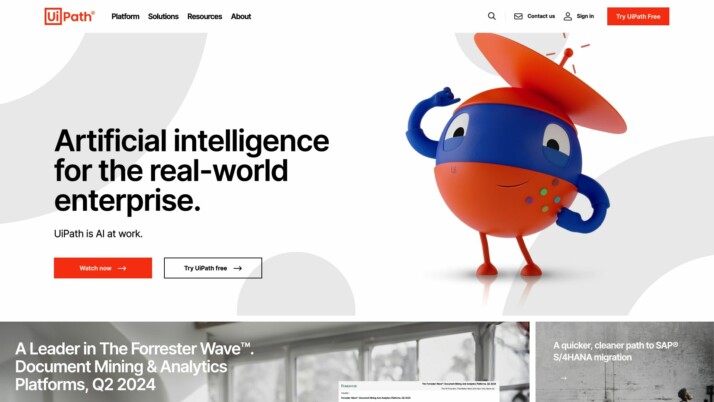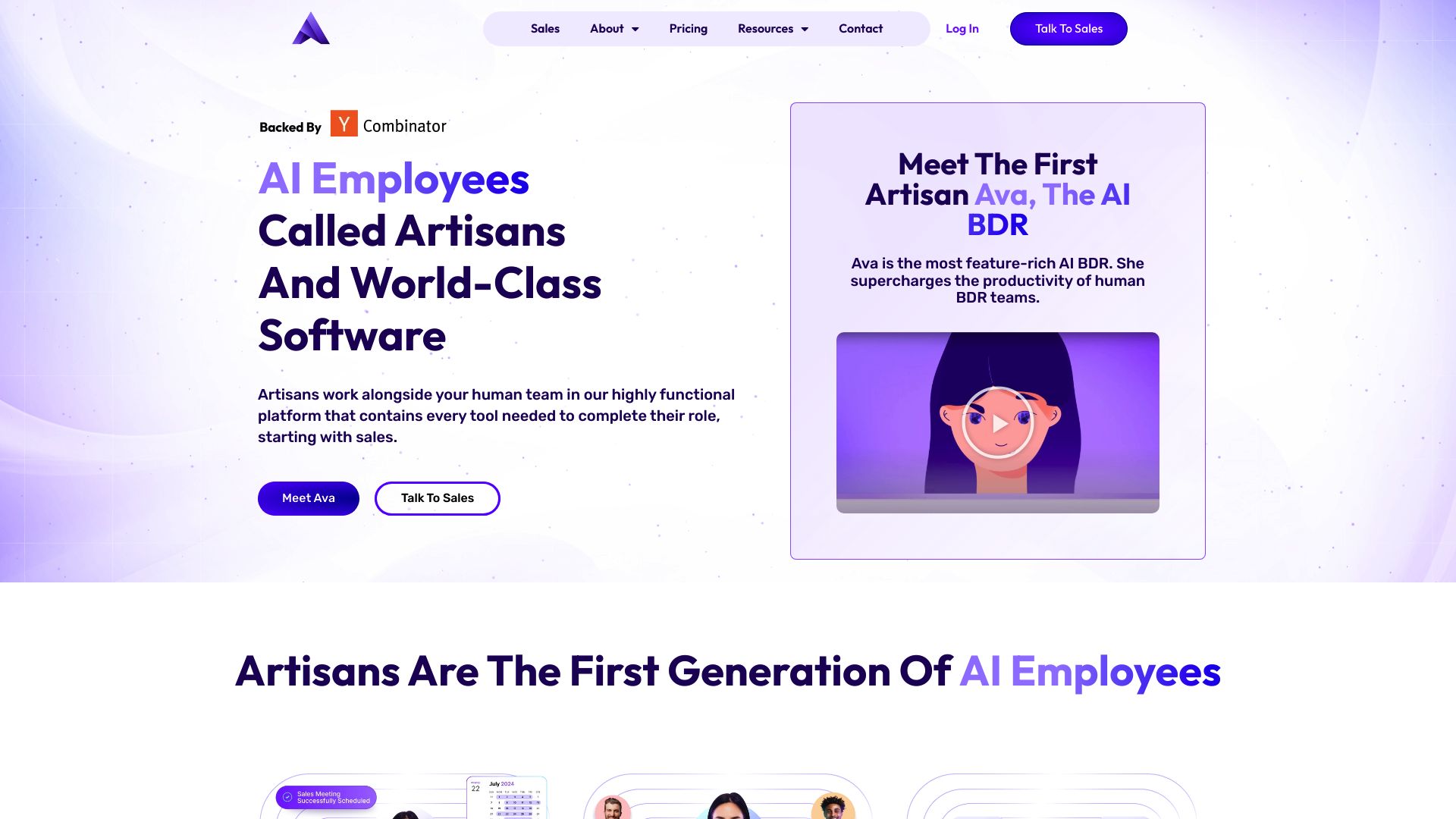UiPath vs. Artisan AI: Comparing AI-Driven Automation Platforms
Artificial intelligence has transformed from a futuristic concept into a powerful business tool, with platforms like UiPath vs. Artisan AI, and SmythOS leading the charge. This comparison explores how these technologies automate workflows, enhance productivity, and integrate AI into everyday business operations. We’ll examine each platform’s strengths, limitations, and ideal use cases, providing insights to help you navigate the complex landscape of AI-driven automation. Whether you’re a developer seeking advanced customization, a business leader focused on scalability, or a non-technical professional looking for user-friendly solutions, this guide will equip you with the knowledge to make informed decisions about implementing AI in your organization.
UiPath Overview
UiPath revolutionizes business automation with its comprehensive Robotic Process Automation (RPA) platform. The company’s flagship product, UiPath Enterprise RPA Platform, empowers organizations to automate repetitive tasks, streamline workflows, and enhance productivity across various industries.


UiPath’s platform excels in automating rule-based processes, making it ideal for finance, healthcare, and customer service sectors. Its visual interface allows both technical and non-technical users to design complex automation workflows without extensive coding knowledge. This accessibility democratizes automation, enabling rapid deployment of digital workers across organizations.
UiPath’s platform excels in automating rule-based processes… Its visual interface allows both technical and non-technical users to design complex automation workflows without extensive coding knowledge.
UiPath stands out with its robust AI and machine learning capabilities. The UiPath AI Center integrates cutting-edge AI models into automation workflows, enabling intelligent decision-making and data processing. This fusion of RPA and AI positions UiPath as a leader in intelligent automation, capable of handling both structured and unstructured data with ease.
While UiPath offers powerful automation tools, users may face challenges in managing complex deployments at scale. The platform’s enterprise focus can make it less suitable for smaller businesses or individual developers seeking simpler automation solutions. Additionally, the learning curve for advanced features may require significant time investment for non-technical users.
UiPath’s ecosystem includes Studio for development, Orchestrator for deployment and management, and Insights for analytics. This integrated approach ensures seamless automation lifecycle management. The platform’s extensive API support and compatibility with various enterprise systems facilitate smooth integration into existing IT infrastructures, enhancing its utility in diverse business environments.
Artisan AI Overview
Artisan AI offers a SaaS platform for creating AI-powered digital workers called Artisans. These intelligent agents automate business workflows, boosting productivity without replacing human jobs. Artisan AI’s no-code approach makes advanced AI accessible to non-technical users, allowing teams to integrate artificial intelligence into their processes easily.
Artisan AI’s no-code approach makes advanced AI accessible to non-technical users, allowing teams to integrate artificial intelligence into their processes easily.


The platform’s key strengths lie in its hosted AI agents, which require no infrastructure management, and its focus on autonomous operation. Artisans self-improve over time, minimizing the need for ongoing human input. The initial product, Ava, serves as an AI sales representative, automating outbound sales workflows and demonstrating the platform’s potential for streamlining business operations.
Artisans self-improve over time, minimizing the need for ongoing human input.
Artisan AI’s pricing model operates on a usage basis, with plans determined by the number of leads contacted monthly. This scalable approach allows businesses to adjust their AI implementation based on their specific needs and growth. While the platform excels in sales and marketing automation, its application extends to various business domains, promising enhanced productivity across different sectors.
However, Artisan AI’s specialization in sales and marketing may limit its appeal for users seeking more diverse AI applications. The platform’s effectiveness in handling complex, multi-step workflows outside its primary focus areas remains to be fully demonstrated. Additionally, as with many AI platforms, the quality of results heavily depends on the data input and the specific use case, which may require careful consideration and planning for optimal outcomes.
Despite these potential limitations, Artisan AI’s user-friendly interface and focus on practical business applications make it an attractive option for organizations looking to harness AI power without extensive technical expertise. Its ability to integrate AI agents as digital team members aligns well with the growing trend of human-AI collaboration in the workplace.
Feature Comparison
UiPath and Artisan AI offer distinct approaches to automation and AI integration, with notable feature gaps between them. UiPath excels in robotic process automation (RPA) with its comprehensive Enterprise RPA Platform, while Artisan AI focuses on creating AI-powered digital workers called Artisans.
In terms of core components, UiPath provides a robust visual builder through UiPath Studio, allowing both technical and non-technical users to design complex automation workflows. Artisan AI, however, emphasizes a no-code approach, making AI integration more accessible to users without programming skills. This difference highlights a gap in flexibility, where UiPath offers more customization options for advanced users, while Artisan AI prioritizes ease of use for a broader audience.
Security features present another area of divergence. UiPath implements strong data encryption and IP control mechanisms, crucial for enterprise-level deployments. Artisan AI’s security features are less prominently detailed, potentially indicating a gap in enterprise-grade security measures compared to UiPath. This disparity could be significant for organizations with stringent data protection requirements.
Feature Comparison Table
| UiPath | Artisan AI | SmythOS | |
|---|---|---|---|
| CORE FEATURES | |||
| AI Agents | ❌ | ✅ | ✅ |
| Hosted Agents (Dev, Production) | ❌ | ✅ | ✅ |
| Environments (Dev, Production) | ✅ | ❌ | ✅ |
| Visual Builder | ✅ | ❌ | ✅ |
| No-Code Options | ❌ | ✅ | ✅ |
| Memory & Context | ❌ | ✅ | ✅ |
| Autonomous Agents | ❌ | ✅ | ✅ |
| Explainability & Transparency | ❌ | ❌ | ✅ |
| Debug Tools | ✅ | ❌ | ✅ |
| Multimodal | ❌ | ❌ | ✅ |
| Problem-Solving Capabilities | ❌ | ✅ | ✅ |
| Multi-Agent Collaboration | ❌ | ❌ | ✅ |
| Audit Logs for Analytics | ✅ | ❌ | ✅ |
| Work as Team | ❌ | ✅ | ✅ |
| Logs & Monitoring | ✅ | ❌ | ✅ |
| SECURITY | |||
| Constrained Alignment | ❌ | ❌ | ✅ |
| Data Encryption | ✅ | ❌ | ✅ |
| OAuth | ✅ | ❌ | ✅ |
| IP Control | ✅ | ❌ | ✅ |
| COMPONENTS | |||
| Foundation AIs | ❌ | ❌ | ✅ |
| Huggingface AIs | ❌ | ❌ | ✅ |
| Zapier APIs | ❌ | ❌ | ✅ |
| All other APIs, RPA | ✅ | ❌ | ✅ |
| Classifiers | ❌ | ❌ | ✅ |
| Logic | ✅ | ❌ | ✅ |
| Data Lakes | ❌ | ❌ | ✅ |
| DEPLOYMENT OPTIONS (EMBODIMENTS) | |||
| Deploy as API | ❌ | ❌ | ✅ |
| Deploy as Webhook | ❌ | ❌ | ✅ |
| Staging Domains | ❌ | ❌ | ✅ |
| Production Domains | ❌ | ✅ | ✅ |
| API Authentication (OAuth + Key) | ✅ | ❌ | ✅ |
| Deploy as Site Chat | ❌ | ❌ | ✅ |
| Deploy as Scheduled Agent | ❌ | ❌ | ✅ |
| Deploy as GPT | ❌ | ❌ | ✅ |
| DATA LAKE SUPPORT | |||
| Hosted Vector Database | ❌ | ❌ | ✅ |
| Sitemap Crawler | ❌ | ❌ | ✅ |
| YouTube Transcript Crawler | ❌ | ❌ | ✅ |
| URL Crawler | ❌ | ❌ | ✅ |
| PDF Support | ✅ | ❌ | ✅ |
| Word File Support | ✅ | ❌ | ✅ |
| TXT File Support | ❌ | ❌ | ✅ |
Best Alternative to UiPath and Artisan AI
SmythOS stands out as the superior alternative to UiPath and Artisan AI, offering a comprehensive AI automation platform that combines power with accessibility. Our platform addresses the limitations of both competitors, providing a versatile solution for businesses of all sizes.
Unlike UiPath’s complex RPA focus or Artisan AI’s limited AI-powered digital workers, SmythOS delivers a full spectrum of AI capabilities. We offer a user-friendly visual builder that surpasses UiPath’s technical barriers while providing more advanced customization options than Artisan AI’s no-code approach. This balance empowers both technical and non-technical users to create sophisticated AI workflows efficiently.
SmythOS delivers a full spectrum of AI capabilities… empowers both technical and non-technical users to create sophisticated AI workflows efficiently.
SmythOS excels in security and scalability, critical areas where Artisan AI falls short. We implement robust data encryption, OAuth integration, and IP control mechanisms, matching and exceeding UiPath’s enterprise-grade security measures. Our platform scales seamlessly to meet growing business demands, ensuring long-term viability for organizations of all sizes.
Our platform’s extensive integration ecosystem sets it apart from both UiPath and Artisan AI. SmythOS supports a wide array of AI models, APIs, and data sources, including Foundation AIs, Huggingface models, and Zapier integrations. This versatility allows for the creation of truly intelligent and context-aware AI agents capable of handling complex tasks across various domains.
With SmythOS, we’ve eliminated the limitations of UiPath’s narrow RPA focus and Artisan AI’s constrained AI capabilities. Our platform offers unparalleled flexibility in deployment options, allowing users to deploy AI agents as APIs, webhooks, scheduled tasks, or even GPT models. This adaptability, combined with our intuitive interface and powerful features, makes SmythOS the ideal choice for businesses seeking a comprehensive, future-proof AI automation solution.
Conclusion
UiPath, Artisan AI, and SmythOS each offer unique approaches to business automation and AI integration. UiPath excels in robotic process automation with its comprehensive Enterprise RPA Platform, ideal for large organizations with complex workflows. Artisan AI focuses on creating AI-powered digital workers, emphasizing ease of use for non-technical users in sales and marketing automation.
SmythOS, however, stands out as the superior choice, combining the strengths of both platforms while addressing their limitations. Its drag-and-drop interface rivals UiPath’s visual builder in complexity, yet maintains Artisan AI’s user-friendly approach. SmythOS’s extensive integration ecosystem, supporting over 300,000 integrations, surpasses both competitors in versatility and scalability.
Unlike UiPath’s enterprise focus or Artisan AI’s sales specialization, SmythOS offers unparalleled flexibility. It supports multimodal interactions, advanced problem-solving capabilities, and seamless multi-agent collaboration. This makes SmythOS suitable for a wide range of industries and use cases, from small businesses to large enterprises.
For those seeking to harness the full potential of AI and automation, SmythOS is the clear choice. We invite you to explore our diverse range of AI-powered agent templates and experience the future of workforce automation. Get started with SmythOS today and transform your business with intelligent AI solutions that adapt to your unique needs.
Last updated:
Disclaimer: The information presented in this article is for general informational purposes only and is provided as is. While we strive to keep the content up-to-date and accurate, we make no representations or warranties of any kind, express or implied, about the completeness, accuracy, reliability, suitability, or availability of the information contained in this article.
Any reliance you place on such information is strictly at your own risk. We reserve the right to make additions, deletions, or modifications to the contents of this article at any time without prior notice.
In no event will we be liable for any loss or damage including without limitation, indirect or consequential loss or damage, or any loss or damage whatsoever arising from loss of data, profits, or any other loss not specified herein arising out of, or in connection with, the use of this article.
Despite our best efforts, this article may contain oversights, errors, or omissions. If you notice any inaccuracies or have concerns about the content, please report them through our content feedback form. Your input helps us maintain the quality and reliability of our information.
